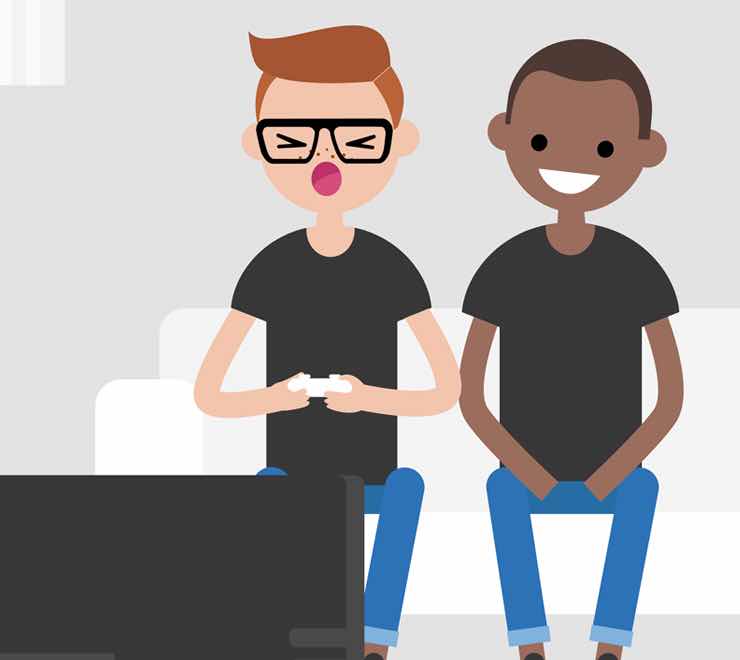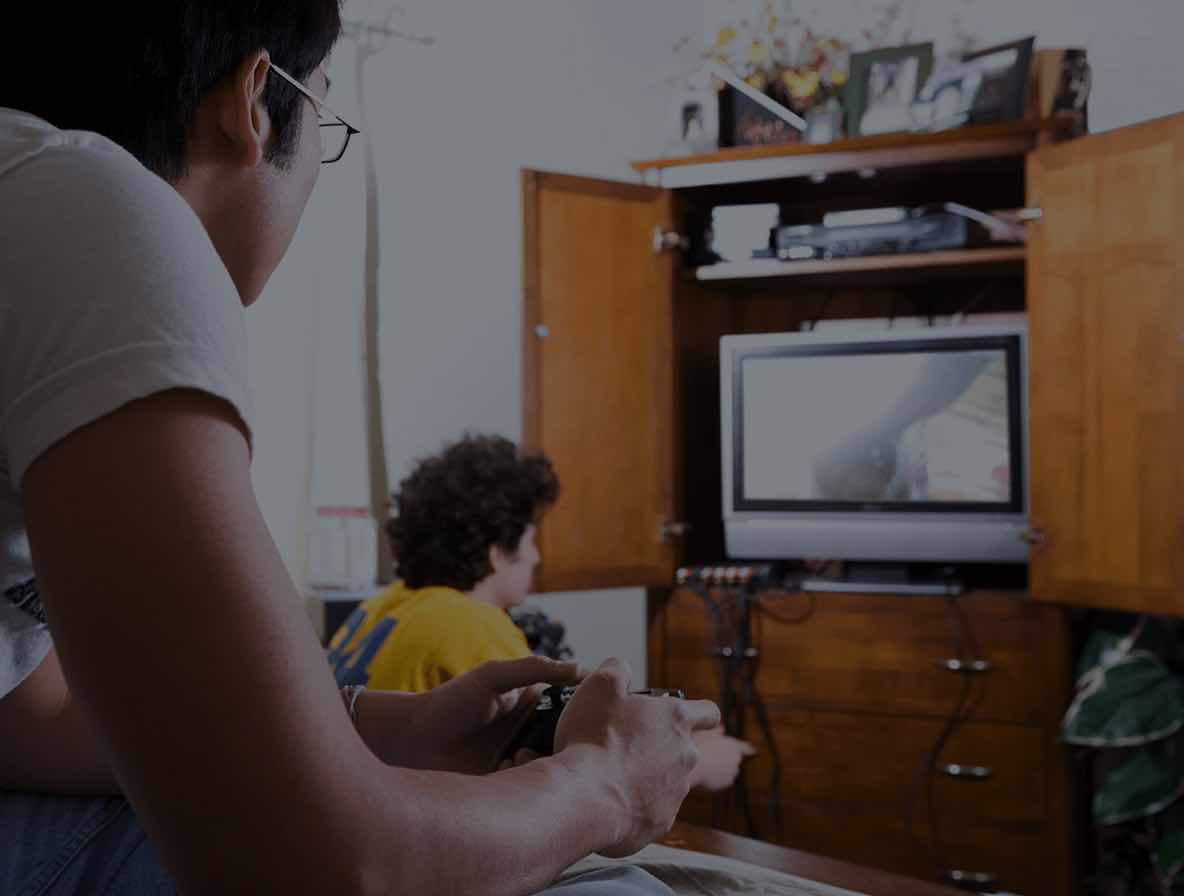With millions of players worldwide, online gaming is a big part of many people’s lives. But for some people, it can become a serious problem.
There’s nothing wrong with playing online games, just as long as it’s balanced with a healthy offline life.
Sometimes, gaming can become addictive. You can develop the need to play all the time, which can get in the way of school, hobbies and even spending time with friends and family.
Here are some signs that may suggest online gaming is becoming a problem in your life:
- you play for long periods of time (24-80 hours per week)
- you think or talk about gaming more than anything else
- you often lie about how much time they spend online
- gaming affects your schoolwork or your relationships with friends or family
- you can’t stop gaming, even though you want to
How do I stop or cut back on gaming?
While fun at first, online gaming can become addictive and take priority over things like friends, family and exercise.
Online gaming can become a large part of someone’s life, so stopping or cutting back isn’t always easy. These tips can help:
- Make a list: write down all the effects online gaming has on your life. Include both the pros (it’s fun, it’s an escape, etc.) and the cons (less time to spend with friends, it can be expensive, lack of exercise, etc.). What does the list tell you about why you game?
- Set goals: a great way to cut back is to set attainable goals. Measure the amount of time you spend gaming and set goals to reduce it by a small amount each day, gradually increasing your goal over time. Consider asking your family or friends to help you stick to your new limits. Don’t forget to reward yourself when you reach your goals.
- Create obstacles: think of ways to make gaming less convenient (keep your console in a shared room, let your memberships run out, try not to buy the newest games, etc.).
- Stay busy: make a list of things you enjoy outside of gaming (sports, hanging out with friends, writing, reading, etc.) and try to incorporate these activities into your day more and more. Exercising can help you work off stress, too.
- Prioritize: make sure gaming doesn’t interfere with your health or school by sticking to some basic rules (do your homework before logging on, never skip a meal or eat while playing, log off 30 minutes before bedtime, etc.).
- Talk it out: it’s common for some people to game a lot because their online life feels better or safer than their offline life. If there’s something in your life that’s upsetting you, try talking about it with someone you trust or a safe adult. There are also professional support groups for people struggling with online gaming. You can always call Kids Help Phone at 1-800-668-6868 if you need to talk.
How to help a friend with a gaming problem
If you’re worried about a friend who may have a problem with online gaming, there are things you can do to help.
When online gaming becomes more than a hobby, a person can become absorbed.
You may notice that you’re seeing less of your friend or that they’ve become less interested in time away from their computer or console. This can affect the people closest to them, including their friends and family. Here are some things you can look for in friends who may have a problem:
- they play for long periods of time (24-80 hours per week)
- they mostly talk about gaming
- they’re not honest about how much time they spend online
- they can’t stop gaming, even though they may want to
Talking to your friend about a gaming problem
If your friend has a gaming problem, all you can do is be there for them — you can’t make them give up or change their behaviour.
If you decide to talk to your friend, it’s important to let them know that you’re concerned because you care. Getting angry won’t help the situation. Here are some tips for approaching the conversation:
- Keep it private: approach your friend somewhere private and away from distractions.
- Be open: focus on how your friend’s behaviour is affecting you. Use “I” statements like, “When you break plans with me to game, I feel sad and let down.”
- Be specific: be honest and straightforward about why you’re concerned. Say, “I’m worried because last night you said you only played for a couple of hours, but I know it was more.”
- Don’t tell them what to do: only they can make a change. Ask, “What do you think would help? What can I do to make things easier for you?”
- Stay calm: if your friend wants to talk, try to be calm, caring and non-judgmental.
- Consider timing: your friend may not be ready to change right away. They may not be ready to hear your concerns because they believe that they can control their gaming or they feel like gaming has more positive than negative consequences. They may get angry and tell you it’s none of your business, but they may also be happy that you started the conversation.
- Don’t push: if your friend doesn’t want help, don’t push them. Let them know that you’re there for them in the future. Remember, it can take a long time for someone to realize that they have a problem.
- Get more support: if they open up, you can let them know that Kids Help Phone’s professional counsellors are available to talk 24/7 at 1-800-668-6868.
In the meantime
You may feel sad, frustrated or worried about your friend. These are all common feelings. Here are some tips for taking care of yourself:
- Take a break: do something you enjoy or hang out with people who aren’t involved in gaming.
- Talk to someone: spend time with a supportive friend or a safe adult. You can always call Kids Help Phone at 1-800-668-6868 if you need to talk.
- Remember: you’re not expected to solve someone else’s problem. All you can do is express your concerns and be supportive. By talking to them, you’re being a good friend.
An adult in my life games all of the time
Online gaming isn’t just for young people — adults can also become addicted. If the adult in your life games a lot, it can have a big impact on your life.
Adults are spending more and more time gaming online. An adult’s gaming can have the same effect on friends and family as a young person’s gaming. If the adult in your life has an online gaming addiction, you may notice:
- Absence: you may see a lot less of the person or they may seem distracted when they’re spending time with you.
- Emotions: the person may seem angry, upset or sad.
- Impact: you may begin to feel lonely, neglected or like no one understands.
It’s common to want to try and convince the person to cut back on gaming, but try to keep in mind that they won’t change unless they want to. You need to take care of yourself so that you’re able to deal with your own feelings, too. Here are some tips for taking care of yourself:
- Spend time with loved ones: spending time with friends or other family members can help with feelings of loneliness and abandonment.
- Talk it out: bring up your concerns with someone you trust. Talking to someone, like another relative, can help you find ways to cope. If you’re feeling neglected or unsafe, you can call Kids Help Phone at 1-800-688-6868 for support.















